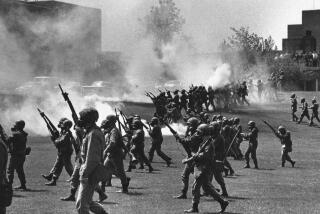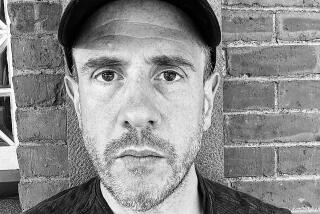CIA, under Tenet’s watch
GEORGE Tenet, the former director of Central Intelligence, has written a memoir -- “At the Center of the Storm: My Years at the CIA” -- that calls to mind the old quip about the talking dog. What’s truly remarkable about the performance is not so much what the dog has to say, but that he speaks at all.
The era in which CIA agents and their leaders took secrets to their graves is behind us, of course, but the notion of a DCI laying out his dealings with the president of the United States while the chief executive still is in office is something new under the sun. In that sense, Tenet’s book is part and parcel of the astonishing number of tell-alls this loyalty-obsessed White House has spawned. At some point, George W. Bush’s administration became the literary equivalent of a television reality show.
That’s hardly the most discomforting thing about Tenet’s alternately fascinating and frustrating -- and very readable -- recollection. Far more disturbing is the fact that the country’s former spook-in-chief remains disquietingly mystified by so many things -- not serious issues like “Where is Osama bin Laden hiding?” but elementary questions touching on his own conduct in office.
For example, on Sept. 12, 2001, then-CIA Director Tenet arrived at the White House and encountered neoconservative firebrand Richard N. Perle, a passing acquaintance. As Perle was leaving, he paused to tell the spy chief that “Iraq must pay a price for what happened yesterday. They bear responsibility.” Tenet wondered what Perle had been doing at the White House on such a day. By his own account, “I never learned the answer to that question.” Similarly, he writes, “One of the great mysteries to me is exactly when the war in Iraq became inevitable.”
Really?
Three years later, as Tenet prepared to resign, he considered his seven-year directorate and what he considered his accomplishments: “the rebuilding of a broken agency, the restoration of morale, the successes in Afghanistan and the larger war on terrorism, the takedown of [Pakistani nuclear scientist] A.Q. Khan and the neutralizing of WMD development in Libya,” among others, he writes. “What I couldn’t stop wondering was, had the president been convinced by some of his advisors that the blame [for the failure to find nuclear or biological weapons in Iraq] should be shifted to me? In the end, I will never know the answer to that question.”
Oh, come on ...
Still, Tenet’s account of his years with the CIA contains a great deal of real value and genuine interest on all those other questions.
Like everyone else who served the United States through this era, however, his reputation will stand or fall on the Iraq question. And, in a dense “Afterword” that seems to bear the clearest marks of Tenet’s hand, the former director speaks most directly to the issues likely to draw readers to his memoir.
“Terrorism and Iraq were the two most pressing issues of my tenure, but as critical as they are, we should not be blind to other issues in that troubled region,” he writes. “The Middle East is less stable today than at any time in the past quarter century. The security of Israel is at greater peril than at any time I can remember. The United States entered into the war in Iraq and acted as if our actions there had no relationship to the Middle East peace process, events in Lebanon or Syria, or to the broad struggle against Sunni Islamic terrorism.”
Concerning the run-up to the invasion of Iraq, Tenet concludes: “The core of [the CIA’s] judgments turned out to be wrong for 100 different reasons that go to the heart of what we call our ‘tradecraft.’ ” He is unwilling, though, to see the agency shoulder any responsibility for the debacle that has followed Saddam Hussein’s fall. “Even if the invading coalition forces had discovered stockpiles of WMD [weapons of mass destruction] in Iraq after Saddam’s ouster, the current situation on the ground would be the same. The same U.S. post-invasion policies would have produced the same disastrous results. While we got it wrong on much of our WMD analysis, we correctly anticipated what might ensue during an extended occupation. What I did not know at the time was how badly our government would mishandle the invasion’s aftermath and the effort to win the peace. Once on the ground, the CIA provided clear warning of a growing insurgency. The problem was that our warnings were not heeded. For too long our government was either unable or unwilling to look at new facts and transform its policy. As a consequence, a domestic insurgency in Iraq worsened daily and the political and military situation spiraled out of control. We followed a policy built on hope rather than fact.”
Tenet believes that the strategies now being pursued by the Iraq war’s commander, Army Gen. David H. Petraeus -- known collectively as “the surge” -- might “have worked more than three years ago -- before a country that believed it had a national identity reverted to the politics of religious and ethnic identification.... In the end it will not matter how many troops the United States puts on the ground. Only Iraqis can determine what kind of country they want and whether they want to pursue a national reconciliation that allows them to remain unified.”
The former intelligence chief is discreetly critical of the Bush administration’s monochromatic view of Iran and skeptical about a policy toward Tehran based purely on confrontation. American diplomacy in the region has to include talks with Iran and Syria, Tenet contends. One of the administration’s key failures in the Mideast, he writes, is not realizing that it’s operating in a part of the world where you frequently need to “fight and talk” at the same time.
At the end of this long and necessarily episodic account, it’s interesting to step back and consider what Tenet’s performance as CIA director might have looked like from the perspective of his “clients” in the White House. His fascinating account of his service is studded with internal contradictions -- not so much contradictions of fact, as of the assessments drawn from the facts as stated. That suggests, at least to this reader, that Tenet might have been a rather frustrating spy chief, long on diplomacy, short on clearly stated conclusions, if not on candor. For example, he’s keen to make the by now not very controversial point that the circle of neoconservatives -- including Perle, Douglas J. Feith, Paul D. Wolfowitz and I. Lewis “Scooter” Libby -- who accompanied Vice President Dick Cheney into the administration were set on war with Iraq when they came to Washington and seized on 9/11 as a pretext to realize that aim. All are long gone, yet the war proceeds as if they were still in positions of influence.
That would seem to shift the focus to their patron, Cheney, yet in Tenet’s account, the vice president is a shrewd and dedicated executive, strongly supportive of the CIA with a sophisticated grasp of intelligence work. In fact, Cheney still goes about the country insisting on a prewar connection between Al Qaeda and Hussein’s regime that Tenet convincingly says never existed.
Something similar occurs in the former director’s appraisal of President Bush. Although Tenet takes great pains to describe how divided and counterproductive the administration’s foreign policies and counsels have been, he nonetheless insists that the president is a disciplined leader, “absolutely in charge, determined and directed.” The author, who clearly dotes on his son, goes out of his way to acknowledge Bush’s touching consideration for the high school student. When Tenet told the boy that he was resigning, in part because he felt his job kept them apart, the son worried that the president would be angry at him for being the cause of his father’s departure. Told of the anxiety, Bush made a private call to reassure the boy. On another occasion, the president, mindful of the toll his own father’s service as CIA chief had taken on their relationship, invited Tenet’s son to the White House for a private chat.
This is fascinating detail, but it’s too much of a piece with the author’s repeated, but rather superficial allusions to his and his wife’s Greek heritage, his parents’ lives as immigrants, his “working class” Queens boyhood and all the rest of it. It’s unclear what significance Tenet attaches to these details, other than the fact that Greek in his lexicon seems synonymous with warm and caring and that his background sets him apart from the Ivy-educated, blue-blood patricians who are supposed to inhabit the upper echelons at Langley. Actually, it’s been a long time since that particular stereotype seemed relevant, and while it’s fine to be proud of your family, it’s hard to see the relevance here. It’s all a little too much like the “life stories” we now demand of our politicians -- as in, “I don’t know exactly where he stands on the issues, but he has a great life story.”
Somehow even in this era, when the personal seems to trump all, one wants in a director of Central Intelligence just a little less conventional piety and sentimentality, and a slightly brighter glint of steel.
That said, it’s impossible to quibble with the conclusion Tenet draws from the debacle in Iraq: “We should enter in wars of choice only with the greatest reluctance, and then only after being completely honest with ourselves and the world about our rationale for undertaking such missions.”
It’s not what the author intended, but the conclusion one takes away from “At the Center of the Storm” is that Tenet’s greatest shortcoming as a public servant was that he failed to act on that insight when it might have made a difference.
*
At the Center of the Storm
My Years at the CIA
George Tenet with Bill Harlow
HarperCollins: 550 pp., $30
More to Read
Sign up for our Book Club newsletter
Get the latest news, events and more from the Los Angeles Times Book Club, and help us get L.A. reading and talking.
You may occasionally receive promotional content from the Los Angeles Times.






